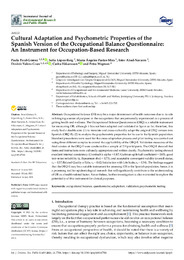Please use this identifier to cite or link to this item:
https://hdl.handle.net/11000/34809Full metadata record
| DC Field | Value | Language |
|---|---|---|
| dc.contributor.author | Peral Gómez, Paula | - |
| dc.contributor.author | López Roig, Sofía | - |
| dc.contributor.author | Pastor Mira, María Ángeles | - |
| dc.contributor.author | Abad, Ester | - |
| dc.contributor.author | Valera Gran, Desirée | - |
| dc.contributor.author | Håkansson, Carita | - |
| dc.contributor.author | Wagman, Petra | - |
| dc.contributor.other | Departamentos de la UMH::Ciencias del Comportamiento y salud | es_ES |
| dc.date.accessioned | 2025-01-17T09:16:59Z | - |
| dc.date.available | 2025-01-17T09:16:59Z | - |
| dc.date.created | 2021-07 | - |
| dc.identifier.citation | Environ. Res. Public Health 2021, 18, 7506 | es_ES |
| dc.identifier.issn | 1660-4601 | - |
| dc.identifier.issn | 1661-7827 | - |
| dc.identifier.uri | https://hdl.handle.net/11000/34809 | - |
| dc.description.abstract | : Occupational balance (OB) may be a major determinant of health outcomes due to its role in bringing a sense of purpose in the occupations that are personally experienced as a process of getting health and wellness. The Occupational Balance Questionnaire (OBQ) is a reliable instrument for measuring OB, although it has not been adapted and validated in Spain so far; therefore, this study had a double aim: (1) to translate and cross-culturally adapt the original OBQ version into Spanish (OBQ-E); (2) to analyze the psychometric properties for its use in the Spanish population. Standard procedures were used for the cross-adaptation process and pilot testing was carried out using three different samples to extend the applicability of the OBQ-E. Validation measures of the f inal version of the OBQ-E were conducted in a sample of 219 participants. The OBQ-E showed that items and instructions were culturally appropriate and written clearly. Psychometric testing showed excellent internal consistency (Cronbach’s alpha = 0.87; Guttman split-half coefficient = 0.85), good test–retest reliability (rs (Spearman rho) = 0.73), and acceptable convergent validity (overall status, rs = 0.37; Related Quality of Life, rs = 0.42; Satisfaction with Life Scale, rs = 0.54). The findings suggest that the OBQ-E may be a suitable instrument for assessing OB in the Spanish population; hence, it is a promising tool for epidemiological research that will significantly contribute to the understanding of OBas ahealth-related factor. Nevertheless, further investigation is also warranted to explore the potentiality of this instrument for clinical purposes. | es_ES |
| dc.format | application/pdf | es_ES |
| dc.format.extent | 12 | es_ES |
| dc.language.iso | eng | es_ES |
| dc.publisher | MDPI | es_ES |
| dc.rights | info:eu-repo/semantics/openAccess | es_ES |
| dc.rights | Attribution-NonCommercial-NoDerivatives 4.0 Internacional | * |
| dc.rights.uri | http://creativecommons.org/licenses/by-nc-nd/4.0/ | * |
| dc.subject | occupational balance | es_ES |
| dc.subject | questionnaire | es_ES |
| dc.subject | adaptation | es_ES |
| dc.subject | validation | es_ES |
| dc.subject | psychometric testing | es_ES |
| dc.subject.other | CDU::6 - Ciencias aplicadas::60 - Cuestiones generales de las ciencias aplicadas | es_ES |
| dc.title | Cultural Adaptation and Psychometric Properties of the Spanish Version of the Occupational Balance Questionnaire: An Instrument for Occupation-Based Research | es_ES |
| dc.type | info:eu-repo/semantics/article | es_ES |
| dc.relation.publisherversion | https://doi.org/10.3390/ ijerph18147506 | es_ES |

View/Open:
2021 Peral et al (1).pdf
526,76 kB
Adobe PDF
Share:
.png)
